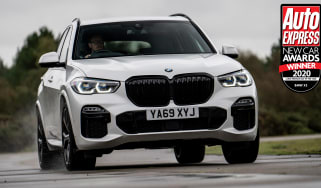BMW X5 review: impressively well-rounded large SUV
The BMW X5 remains an outstanding choice in the large SUV class, delivering superb performance, practicality and technology

The latest edition of the BMW X5 builds on the success of its predecessors with a fresh slate that sees improvements made to the practicality and overall design, as well as upgrades to the infotainment and safety tech. The exterior looks bullish and modern, while the inside is highly luxurious.
There aren’t many engines to choose from in the lineup, but each returns a commendable amount of performance without trampling over fuel efficiency. At the same time, the hybrid continues to be the most cost-effective option for company car drivers. It’s not the most exciting car in the large SUV market, but if you're prioritising comfort, refinement and interior quality, then the X5 is an excellent choice.
About the BMW X5
Currently in its fourth generation, the evolution of the BMW X5 has been typically smooth from BMW’s point of view. The original came along in 1999 and helped set the template for SUVs with four-wheel drive and on-road driving enjoyment at the expense of off-road ability. To underline that point, the X5 was – and continues to be – referred to by BMW as a Sports Activity Vehicle (SAV), rather than the more commonly used phrase of Sports Utility Vehicle (SUV).
However, we’ll continue to refer to it as an SUV, and it sits in BMW’s SUV lineup between the smaller X3 and larger X7. It competes against many luxury SUV rivals, including the Audi Q7, Mercedes GLE, Porsche Cayenne, Range Rover Sport and Volvo XC90.
Used - available now
Its boxy five-door body maximises utility, and its sheer size means you can order an X5 with the option of a third row of seats, unlike the Cayenne or Range Rover Sport. The X5 offers user-friendly features such as electric rear seat folding via a button inside the boot entrance, and an automated ‘hands-free’ split tailgate.
The latest model range includes four engine options: two diesels, two high-performance petrol units and a plug-in hybrid combining petrol power with an electric motor. All engines offer punchy performance and come standard with an eight-speed automatic gearbox and BMW’s xDrive all-wheel drive system.
There are three trim levels to pick from. The xLine comes exclusively with the entry-level xDrive30d diesel engine and has 19-inch alloys, LED headlights and tail lamps, heated leather seats, parking assist and wireless phone charging. Move up to M Sport for a wider choice of engines, plus 20-inch alloys, M Sport brake callipers and blacked-out trim, an M aerodynamics pack, a sports steering wheel and an anthracite headliner. That’s followed by the X5 M60i, which has a few sportier exterior styling tweaks plus a stonking, twin-turbocharged 4.4-litre petrol V8. Heading up the X5 lineup is the X5 M Competition, which uses a BMW Motorsport-tuned version of the M60i, with various tweaks taking the power up to 617bhp.
How much does the BMW X5 cost?
Prices start perilously close to £70,000 (especially once you’ve added metallic paint and an option pack), while the company-car-friendly xDrive50e M Sport is £80,000. That’s a lot of money, but it still significantly undercuts the equivalent GLE or Range Rover Sport. Those after the M60i must fork out at least £90,000, with the top-of-the-range X5 M Competition coming in at nearly £130,000 – and that’s before you get busy with the options list.
Engines, performance and drive
The BMW X5 is well known for its road-focused driving manners, which remains true with the latest generation. But BMW has included an optional ‘xOffroad’ package with xDrive30d and xDrive40d diesel models. It has four specific loose-surface driving modes, some underbody armour to deflect rocks and bumps, and a mechanical locking differential to maximise traction in slippery conditions. You will also have to add optional adjustable suspension that will enable you to alter the ride height so you may clear obstacles (making this a nearly £5000 package), and in the end, the X5 still won’t be as good off-road as a Range Rover Sport. Still, it should be more than capable enough for most owners.
On the road, models equipped with adjustable suspension (only standard on the M Sport xDrive50e and an option on the rest of the X5 range) have a serene and comfortable luxury-car ride, especially when travelling at motorway speeds, where it remains a peaceful and relaxing mode of transport because it suppresses unwanted wind-, road- and engine noise impeccably. Of course, the plug-in hybrid xDrive50e is even quieter when running on electric power only, and it can do so for up to 65 miles. We thought the switch between petrol and electric is almost imperceptible in ‘Hybrid’ mode, with the engine being a little more vocal in ‘Sport’. The only times we caught the system out was when pulling out of a junction with urgency, where we thought it delivered a little too much performance instead of metering its power out to maintain its composure.
The additional weight of the xDrive50e’s battery pack and its larger 20-inch wheels mean it doesn’t cope as well with speed bumps and potholes at lower urban speeds, but things do smooth out once the pace increases. We’re yet to try an X5 on stock suspension, but when we do, we’ll update this review.
All versions of X5 feature the same super-smooth eight-speed automatic gearbox and a 4x4 ‘xDrive’ drivetrain, although it does send more torque to the rear wheels to emphasise the sporty driving feel. It’s a more rewarding driving experience than SUV rivals such as the Mercedes GLE or Volvo XC90, but a Porsche Cayenne is sharper still.
The ‘Integral Active steering’ option pack adds four-wheel steering to make the X5 feel more alert at higher speeds and easier to manoeuvre when parking. However, we found this a little inconsistent in its responses, which reduced our confidence in the X5’s handling.
0-62mph acceleration and top speed
The xDrive30d uses a 3.0-litre straight-six diesel engine with a single turbocharger and mild-hybrid assistance to deliver 293bhp. It's no slouch, covering 0-62mph in 6.1 seconds and topping out at (where it is legal to do so) 145mph. The xDrive40d uses a twin-turbo version of the same engine and is even more potent at 352bhp. It pulls even harder, getting from 0-62mph in just 5.5 seconds.
The xDrive50e is even more impressive, getting from 0-62mph in 4.8 seconds thanks to its 3.0-litre petrol engine and electric motor working together to produce 483bhp. That’s not far off the output of the M60i, which uses a twin-turbocharged 4.4-litre V8 engine to deliver 523bhp, and can manage 0-62mph in a supercar-rivalling 4.3 seconds.
The standalone X5 M Competition takes the same V8 engine on a stage farther, tuning it up to produce a mighty 617bhp and 750Nm of torque, and dropping the 0-62mph dash to a scant 3.8 seconds.
MPG, CO2 and running costs
If you want to minimise running costs, go for the plug-in hybrid xDrive50e. It has a 3.0-litre six-cylinder petrol engine and electric motor powered by a lithium-ion battery with a 25.7kWh usable capacity. The impressive all-electric range of up to 65 miles helps deliver an official fuel consumption figure of 313.9mpg under WLTP testing. You’d need to regularly charge the battery to get anywhere near that figure, though. On a long 450-mile drive, our average on both petrol and electricity was 43.5mpg.
Emissions of 20g/km make the xDrive50e an ideal choice for company car drivers, who stand to make serious savings on their monthly company car tax bills. However, the plug-in hybrid Range Rover Sport P460e has an even larger battery pack and can travel farther on a charge, meaning it sits in an even lower Benefit-in-Kind (BiK) tax bracket.
While the xDrive50e doesn’t have rapid charge capability like the plug-in hybrid Range Rover Sport, the charging speed has been increased from the rather slow 3kW of earlier cars, up to 7.4kW. That decreases recharge times from nine hours, down to four and a half when using a suitably quick wallbox charger.
The xDrive30d will return an average consumption of 39.8mpg, the same as a 300d Mercedes GLE and a little better than a D300 Range Rover Sport. The diesel X5’s 179g/km emissions put it into the top 37 per cent Benefit-in-Kind (BiK) tax bracket, so it’s not cheap from a company car perspective. The other diesel option is the 335bhp xDrive40d, which offers greater performance yet still returns 37.7mpg and 196g/km of CO2.
The petrol-engined M60i is strictly for those with deep pockets, as the 4.4-litre V8 only manages 24.4mpg with CO2 emissions of 263g/km. In comparison, the M Competition model is even less efficient, with fuel economy of 21.1mpg and producing 304g/km of CO2.
Insurance groups
As expected of a powerful, premium SUV, insurance groups start at group 45 for the xDrive30d. The rest of the lineup rises to 47 for the xDrive40d, 49 for the xDrive50e, all the way up to group 50 for the M60i and X5 M Competition.
Those are on par with the equivalent Mercedes GLE and Range Rover Sport. However, the Audi Q7 starts from group 42, making it cheaper to insure.
Check your tax status and renewal date in seconds. Check your VED car tax now...
Depreciation
The undoubted cachet of the BMW badge, the novelty value of the latest-generation X5 and the appeal of its style and technology should mean residual values remain strong. Our expert data suggests that the X5 should hold onto between 40-59 per cent of its original value after three years and 36,000 miles of motoring, with M Sport models generally performing best. The X5 that’ll hold onto its resale value the best will be the xDrive50e M Sport with the technology pack.
A Q7 and GLE will lose significantly more value than the equivalent X5. Those looking for the greatest return on their investment should look towards the Range Rover Sport because the P460 Dynamic SE will retain 68 per cent of its value over the same period.
To get an accurate valuation on a specific model check out our free car valuation tool...
Interior, design and technology
The latest BMW X5 is instantly recognisable, which is something you can say about most other German manufacturers’ evolving model lines. Revisions made to the exterior styling bring it more in line with the brand’s current design themes, so there are thinner headlamps to match the BMW X6, plus you can choose an illuminated kidney grille to match that car and the pricier BMW XM. There aren’t quite as many changes at the rear, besides a set of new tail lights.
Inside, the X5 features the latest curved digital dashboard comprising a 12.3-inch driver display and a 14.9-inch central touchscreen display lifted from the all-electric BMW iX. It replaces the physical buttons for the climate controls, and while the temperature and menu icon are permanently on display, it won’t be as easy to adjust on the move as with the toggle controls found in the Mercedes GLE. Also, the digital driver display doesn’t have the level of customisation you’ll find from Audi’s Virtual Cockpit as featured in the Audi Q7.
The interior quality is excellent, with fine materials, classy finishes, and an overall sense that it’s all screwed together very convincingly. You can option real leather upholstery on the seats and dashboard to replace the standard artificial leather material called Sensafin, along with polished glass for the start/stop button, gear lever and iDrive controller. Speaking of iDrive, there’s also the latest version of BMW’s iDrive control system, which works well, although it’s getting increasingly complicated to navigate.
Interesting options for the X5 include a panoramic sunroof with a starlight night-time illumination mode. You can also have laser headlamps that pierce the gloom with a 500-metre maximum range. Meanwhile, the Offroad pack mentioned earlier brings four loose-surface driving modes – sand, rock, gravel and snow – and adds underbody protection for X5 users who want to see a bit more of the countryside.
Sat-nav, stereo and infotainment
The infotainment set-up features wireless Apple CarPlay connectivity, while Android Auto is provided through a wired connection. The main interface is the iDrive controller situated next to the gear lever, which controls the 14.9-inch screen, although you can also interact with it via touch. The screen's graphics are crisp, and it responds swiftly to inputs. There’s another screen (12.3-inch) in front of the driver, but it’s not as configurable as Audi’s Virtual Cockpit.
As you’d expect, the X5 comes with sat-nav and a fine standard audio system, but if you’re an audiophile, there’s always a 16-speaker, 415-watt Harman Kardon sound system. Or if you’re really hard to please, a 1,500-watt, 20-speaker Bowers & Wilkins diamond surround sound system for even crisper sound quality.
Practicality, comfort and boot space
The BMW X5 is available as a five-seater as standard or with an optional third row of seats. That said, this rearmost row is best suited to children, so if you want to carry lots of grown-ups on a regular basis, then the bigger BMW X7 might be a better choice.
The driving position of the X5 is excellent, with the usual great BMW ergonomics and a vast range of adjustment, particularly from the standard sports seats with electrically adjustable lumbar support, plus a memory function. As part of the Comfort Pack, the optional front comfort seats add additional electric adjustment, such as extendable thigh support. You get a commanding view of the road ahead, too, thanks to the X5’s height, although you’ll be relying on the front and rear parking sensors and rearview camera when parking. You’ll need to add the Technology Plus Pack to get a top-view, 360-degree camera system, which is a little bit of a shame when a similar system comes as standard on the Range Rover Sport.
The interior of the X5 provides plenty of storage, with a large lidded bin between the front seats, a good-sized glovebox and spacious door bins. The front cupholders can even be heated or cooled to either keep your coffee warm or your bottle of water cool, if you add the aforementioned Comfort Pack.
Equally useful is the split tailgate; the lower section provides somewhere to rest your shopping before arranging it in the boot, or somewhere to sit when changing into walking boots or cycling shoes, for example.
Dimensions and size
The latest-generation X5 is a little bigger than the previous BMW x5 and is usefully boxy in its outline, measuring up at 4,922mm long, 2,004mm wide and 1,745mm tall.
The Range Rover Sport is even bigger at 4,946mm x 2047mm x 1,820mm, while the Porsche Cayenne is a touch smaller at 4,918mm x 1,983mm x 1,696mm.
Leg room, head room & passenger space
Legroom and headroom are excellent all around in the BMW X5, and the small transmission tunnel is especially impressive, meaning a third central passenger can sit comfortably on the rear bench seat without making too many compromises. There’s also plenty of shoulder and hip room because the X5's cabin is pretty cavernous.
A worthwhile option is an electric adjustment for the second row of seats; this brings a control panel in the boot, allowing you to slide the bench forward or fold the seatbacks to maximise space as you’re loading.
Boot space
The X5 offers a handsomely spacious boot, although the 650 litres of total volume is beaten by the 690 litres in the Mercedes GLE. The plug-in hybrid xDrive50e reduces this to 500 litres, whereas the Range Rover Sport P460e maintains its capacity at 647 litres. The rear bench in the X5 splits 40:20:40, which is great for passing long luggage items up between the two rear passengers with just the centre section folded.
Alternatively, you can fold everything to release a whopping 1,870 litres of space. The Mercedes gives you over 2,000 litres with everything folded flat, but the rear seat only splits 60:40, so it isn’t as versatile. BMW’s Comfort Access option provides hands-free control of the upper and lower tailgate sections and the retractable load cover.
Towing
With its powerful range of engines, most versions of the X5 offer more than enough towing ability for most buyers. The xDrive30d is a tad disappointing for an SUV of this size with just 1700kg of braked towing capacity, but the xDrive40d ups this to a healthy 2500kg. The plug-in hybrid xDrive50e and M60i can pull even more at 2700kg.
We’d suggest you consider the Range Rover Sport if you need even greater capacity because the P460e can tow 3000kg, while the rest of the range can pull up to 3500kg.
Reliability and safety
As one of the flagship SUV models in BMW’s range, the latest X5 unsurprisingly comes packed with advanced safety tech. The most impressive kit is part of the BMW Driving Assistant Professional system, as part of the Technology Plus Pack, which offers autonomous features like intelligent cruise control with lane-keeping assistance and the ability to keep pace with flowing traffic – including making allowances for vehicles merging into your lane. Other innovations include autonomous emergency braking and an aid that steers into clear space if the system senses an imminent collision with a car or pedestrian.
There are plenty of airbags around the cabin, and all X5s get a crash sensor that activates the central locking release, hazard lights and fuel cut-off. You also get piercing LED headlamps, a speed limiter and the usual safety systems like Electronic Brake-Force Distribution, Stability Control and ABS.
It’s a comprehensive safety package, as you would expect, and Euro NCAP awarded the BMW X5 a five-star safety rating when tested in 2018. The Mercedes GLE also received five stars and was tested under the same regime as the X5, but the GLE scored better in all areas. It’s worth noting that the newer Range Rover Sport, tested in 2022, also received a five-star rating, but it was rated under Euro NCAP’s latest and more stringent regime.
BMW finished a disappointing 21st (out of 32 brands) in our best car manufacturer rankings, which is based on owners' feedback from our latest 2023 Driver Power customer satisfaction survey. That put it ahead of Audi and Mercedes, but behind Porsche and Volvo.
Warranty
The warranty BMW provides for all its models is competitive. You get unlimited mileage coverage for the first three years of ownership, which is better than VW Group products that are subject to a mileage cap of 60,000 miles.
It’s worth mentioning that the battery fitted to the plug-in hybrid xDrive50e is subject to a separate warranty of eight years or 74,500 miles.
Servicing
Fixed-price servicing plans help you spread the cost of keeping your BMW X5 maintained. The servicing schedule depends on how the car’s onboard sensors think your driving style has affected oil quality. High-mileage drivers putting less strain on their engines should get a ‘service required’ message from their car less frequently than urban motorists covering low mileages in stop-start traffic.































